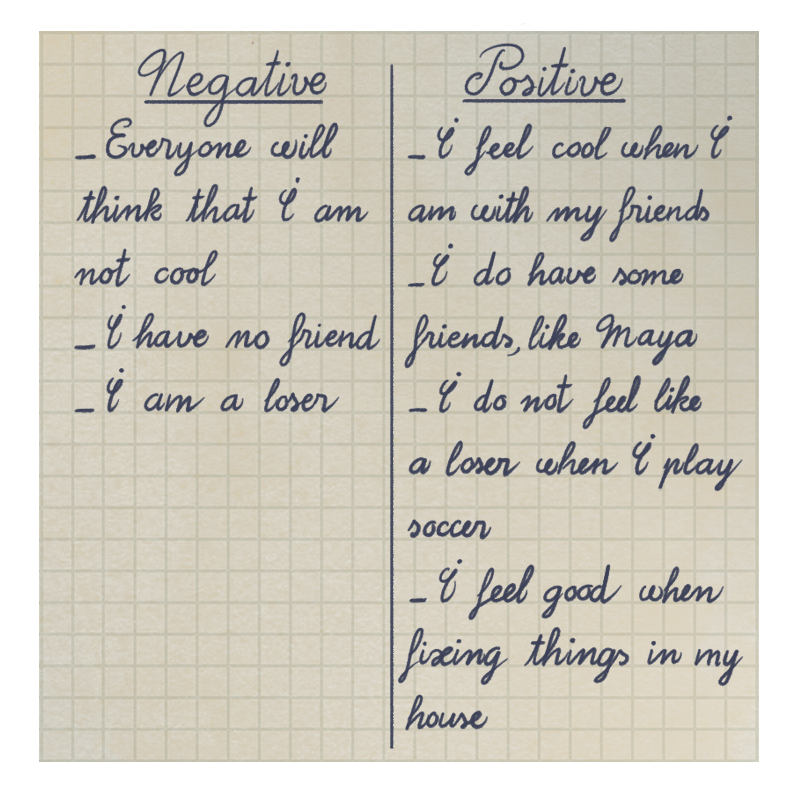





Chapter 8. Positive Thoughts Copy

“Alright, ready for the next coping tool?” you ask.
“Okay,” Nelson replies as he sits up. He turns his head to crack his neck and slaps his cheeks a couple times.
“The next two tools are for thoughts,” you tell him, “and they’ll help us examine thoughts so that we can ask ourselves, ‘Is this a helpful or healthy thought? Are there other possibilities, different perspectives, we can consider?’ Because changing what we think might help us change our other corners.”
Nelson looks right back at you. “I think I follow,” he states.
“So,” you continue, “what happens to our thoughts when we’re stressed? When you’re worried, what kind of thoughts do you tend to have?”
“When I’m worried?” Nelson repeats as he ponders the question. He shifts nervously in his seat. “I don’t know, lots of thoughts, usually. Mostly bad thoughts.”
“And do you usually have just one really bad thought, or does one bad thought lead to another, and another?”
“Yeah,” he mumbles, “it’s always one bad thought leads to another. That’s what happens every time.”
“That’s just how our brains are wired,” you say with a shrug. “When we feel bad, we tend to have bad thoughts—remember the square? But with some practice we can break that cycle of negative thoughts, so we can consistently have more positive thoughts, even in these bad situations, and focus on the thoughts that are helpful to us.”
Nelson, face scrunched, slowly nods in understanding. “Okay, how do we do that?”
You sit up in your seat, smiling, and pull out a paper worksheet. “Two ways! Let’s first start with this worksheet.”
You hand Nelson the paper and he scrutinizes it.
“Can you think of a situation that was slightly upsetting for you last week?”
Nelson looks up from the paper, but not at you. His gaze wanders sideways as he considers the question. “Umm,” he finally mumbles, “there was some gunfire in my neighborhood a few nights ago. That was really scary.”
The answer catches you by surprise. “That sounds overwhelming. How upset were you feeling on your feelings thermometer, from 1 to 10?”
Nelson ponders again. He taps a finger against his bottom lip. “Maybe like a 7. I was pretty scared.”
Your gaze also drops sideways for a brief moment before you look back at Nelson. “That sounds like an experience that we’re going to want to talk about later. But since we’re just learning all the coping tools today, let’s save that one for later.”
Nelson drops his chin and starts chewing his lower lip. You purse your lips as you notice this moment of disappointment.
“Let’s come up with an example together instead,” you brightly announce. “I’ll offer some suggestions and you let me know what you think.”
Nelson looks up.
“Getting a bad grade?”
He shakes his head.
“Mom says you can’t go to a party?”
He scoffs defiantly and nods his head. “That works. That happened to me a couple months ago, and we got into an argument about it.”
“So this positive thoughts worksheet has two columns,” you say as you gesture to the paper in Nelson’s hands, “one with a minus sign and one with a plus sign. Under the minus we’ll list all the negative thoughts you had when your mom said you couldn’t go to the party, and under the plus we’ll list a positive thought that provides evidence against each negative thought.”
“Ok,” Nelson says, looking at the worksheet.
“Do you want to write, or would you like me to write?”
“I can write,” he replies, looking up with his hand extended.
“Okay!” You hand him a pencil. “Let’s start with the negatives. What’s one negative thought that could cross your mind?”
“If my mom says I can’t go to a party, right?” Nelson clarifies. He shrugs. “I don’t know. Everyone will think I’m not cool, probably.”
“That’s a good one,” you affirm. “Let’s write that down. Anything else?”
Nelson scribbles the first thought onto the sheet. When finished he taps the pencil against his bottom lip, deep in thought. “If people don’t think I’m cool, I’ll probably lose all my friends.”
“Okay, let’s write down, ‘I will have no friends.’ Any others?”
“If I lose all my friends, I’ll probably be a loser,” he says with a chuckle. “Now that would really suck.”
“Let’s write that down, too.” You give Nelson some time to write down all these points in the negative column.
“So there you have it! We have all the negative thoughts written down. Now let’s move on over to the positive column. Remember, we want to have a positive counter-thought for each negative thought we wrote down.”
“What exactly is a counter-thought again?” Nelson asks.
“It just means that there’s evidence to suggest other possibilities, that a particular negative thought is not entirely accurate.”
Nelson looks back down at his sheet, reviewing his initial points.
“Let’s try one out and that’ll clarify what I mean,” you offer. “So for the first one, if you said, ‘Everyone will think I’m not cool,’ could there be another possibility? Or rather, is there any evidence that your friends will still think you are cool?”
“I’m not sure,” Nelson murmurs. He fidgets in his seat.
“How about this? When is a time when you do feel cool?”
“When I’m with my friends,” he continues to murmur.
“‘I feel cool when I’m with my friends,’” you repeat. “Could that be a positive thought? Is that a thought you agree with?”
Nelson nods in silence.
“Let’s write that one down,” you say, prompting Nelson to begin writing. “What about the thought, ‘I will have no friends’? Is there a positive thought you can think of for that one?”
Nelson takes a moment to think. His forehead is wrinkled, his eyes have narrowed to slits, and his mouth is puckered with frustration.
“I guess I have Maya,” he finally says. “She’s a good friend of mine.”
“Is Maya the kind of friend who would still hang out with you, even if you don’t make it to this party?” you ask.
“Yeah, I guess so,” Nelson replies with a shrug.
“Well, I like that answer,” you beam. “Let’s write that one down.”
Nelson jots down his response, and he’s slow to withdraw his pencil as he contemplates the final negative thought. “‘I am a loser for the last one,” he says with a small scoff.
“What could be a positive thought for that?”
“I don’t know,” he mutters to himself. “I am a loser.”
“It might be that you feel that way sometimes,” you counter, “but does it happen all the time?”
“I guess not,” Nelson says quietly. “The only time I don’t feel like a loser is when I play soccer. And I can’t play anymore because my leg hurts.” He slaps his outer thigh, and winces.
“Any other times? There must be more.”
“When I’m with friends, I guess.”
“So,” you say unhurriedly, “would it be appropriate to say you don’t feel like a loser when you play soccer and when you’re with friends?”
Nelson nods begrudgingly.
“Is that a thought you can write down?”
Nelson holds the pencil upright and begins writing on the sheet.
“Okay, so that’s three. We need one more!”
The pencil falls limp in Nelson’s hand.
“Can you think of another positive thought? I always like to come up with at least one extra, so that we have more positive than negative thoughts listed on the worksheet.”
Nelson looks down at his list.
“To break up the negative cycle, you see.”
He looks up at you, then up to the ceiling. His hairline is damp with sweat and he wipes with the back of his hand.
“How about something you do at home?” you ask encouragingly. “Is there something there that makes you not feel like a loser?”
Nelson continues to ponder. The silence feels long.
“My grandma’s house, maybe,” he finally says. “She asks me for help fixing things, and she trusts me a lot, so when I help her out, I feel useful and it makes me feel good.”
“Nelson, that’s awesome. Let’s write that one down: ‘When I go and fix things in my grandma’s house, I feel good.’”
Nelson eagerly writes this on the bottom of the sheet, below the two columns. The font he uses is larger than for the previous items, and he even writes over some of the text a few times to put the words in bold.
“And there you have it!” you exclaim with your arms open wide. “This is the kind of exercise that we want you to do when you have these negative thoughts. Write down negative thoughts that come your way, counter them with all these positive thoughts, and then recall them whenever those negative thoughts occur again, to help you feel better.”
Nelson picks up the list and looks directly at it. A smile creeps up on his face. “Got it,” he says.
